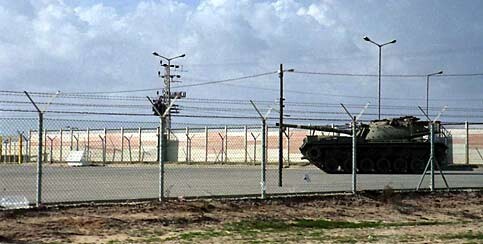
An Israeli tank guards one of the borders between Israel and Gaza. With borders to the north, west and south of the Strip, and Israeli navy boats patrolling the sea, Gaza is essentially a big prison for Palestinians. (Helga Tawil)
On June 26th, I left Britain after a ten-week stay in Birmingham, where I was attending a study course on “working with conflict” . It was organized by a Birmingham-based organization called Responding to Conflict. Having a course about conflict is an empowering and enriching experience, but it is also entirely different from working within the conflict and living within the conflict under occupation.
The feeling of insecurity means we cannot really feel safe anywhere, and the Israeli occupation controls every moment of our daily lives — our movement, our children’s school times, the movement of patients, the water, electricity, the food we subsist on, and the oxygen we breathe. All of this is more overwhelming than most outsiders can imagine.
Returning home to Gaza, I had to fly first to Cairo, then cross the Sinai desert by coach to reach the Rafah border crossing — a journey that takes 6 hours at least, as Palestinians are not allowed to use Ben Gurion airport which is merely an hour’s drive from Gaza). The Gaza Strip is served by a modern international airport — built during the Oslo years — but this has remained closed since late 2000, and now sports a bulldozed runway, courtesy of the Israeli army.

Part of Gaza’s International Airport, destroyed by Israel. (Helga Tawil)
On the Egyptian side of the border and after the routine passport checks, I met hundreds of Palestinian travellers who told me that they had been waiting in the Egyptian departure hall for at least 3 days. The Israelis only allow a certain number of travellers to cross the border into Gaza daily. This leads to a backlog of travellers who are trapped between the Egyptian and Israeli side of the border.
It was a lucky day for me! The Israelis allowed more buses than usual through the border. After waiting for two hours, I was allowed to leave the Egyptian departure hall. I got on the bus that carries travellers and our luggage 30 meters across an electrified gate to reach the Israeli side of the border. We waited on that bus for four long hours. The bus was extremely crowded and included many children and elderly people, some of them in poor health due to the appalling conditions.
It was extremely hot — 104 degrees farenheit — and once you get on the bus between the two gates you are not allowed to get off untill it reached the other side. There were almost 90 people on the bus — double its 52 passenger capacity. When the coach started moving the driver told me that we were lucky to cross on the same day. He said that some travellers had waited 7 hours on the bus in previous days.
Arriving outside the Israeli arrivals lounge, we waited under the artificial shelter, surrounded by palm trees, for another hour. Then we were ushered into a cool air conditioned hall where the Israeli occupation forces welcomed me home. 2 hours of questioning and security checkups ensued, I was then sent to the outer gate where another bus was waiting to deliver me a distance of 20 meters.
This bus dropped us at the last gate where I found the taxi to take me to Gaza City (40 km from Rafah). But after 15 minutes we were stopped at the Abu Holi checkpoint in the middle of the Gaza strip, where all traffic to and from Gaza was halted at this checkpoint for 90 minutes.
At 6pm, 18 hours after I had left Cairo International Airport, I arrived home. Three hours after my arrival, the Palestinian resistance blew up an Israeli army base at the Abu Holi chekpoint. We heard on the news that the Gaza Strip had been completely sealed off by the army, and divided into 5 separate areas as a result. This made moving from one area to another extremely restricted.
This total siege went on for a whole week. I was lucky to get home to my family in the nick of time.
Since my arrival the whole situation has deteriorated further. Several extrajudicial assassinations were carried out by the Israeli air force. The standard shooting and the shelling continued, small military incursions took place in different areas of Gaza, Beit Hanoun was reoccupied for 2 weeks, and the operation there is still ongoing.
I cannot keep tabs on the number of closures and military operations in the Gaza Strip since my arrival in late June. All know for certain is that since my arrival I have been unable to visit my mother who lives in Khan Younis, only 20 minutes south of my home.
Dr. Mona El-Farra works at the Union of Health Work Committees (Arabic site) in Gaza.


